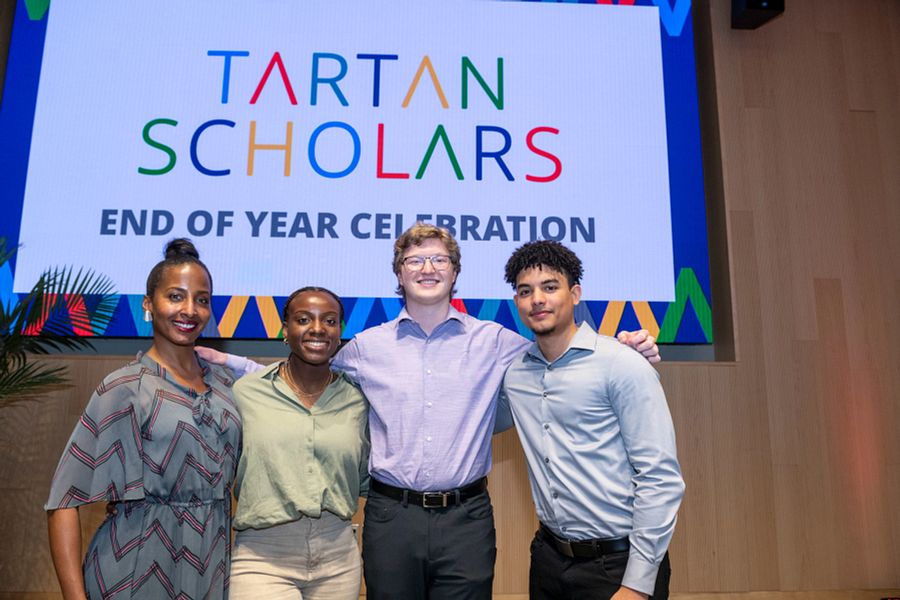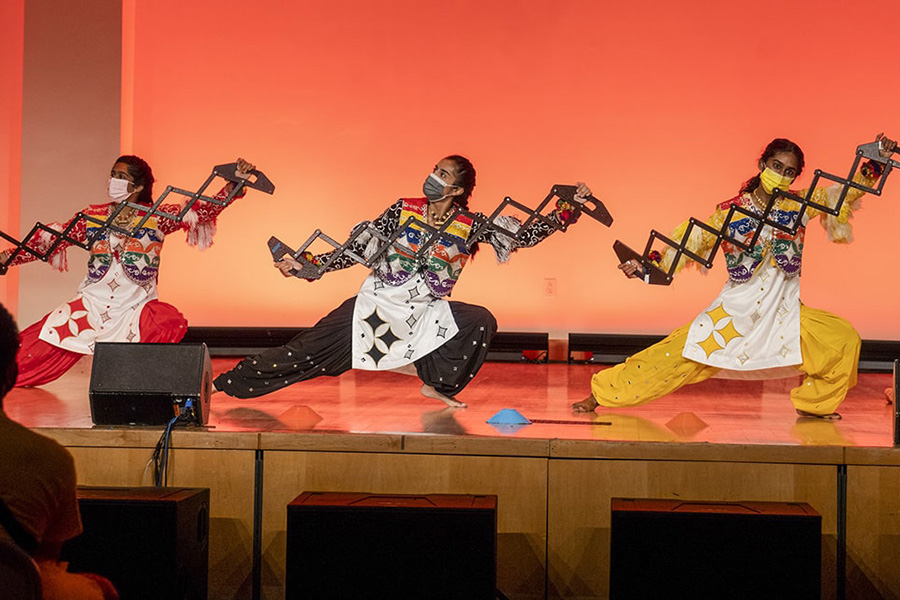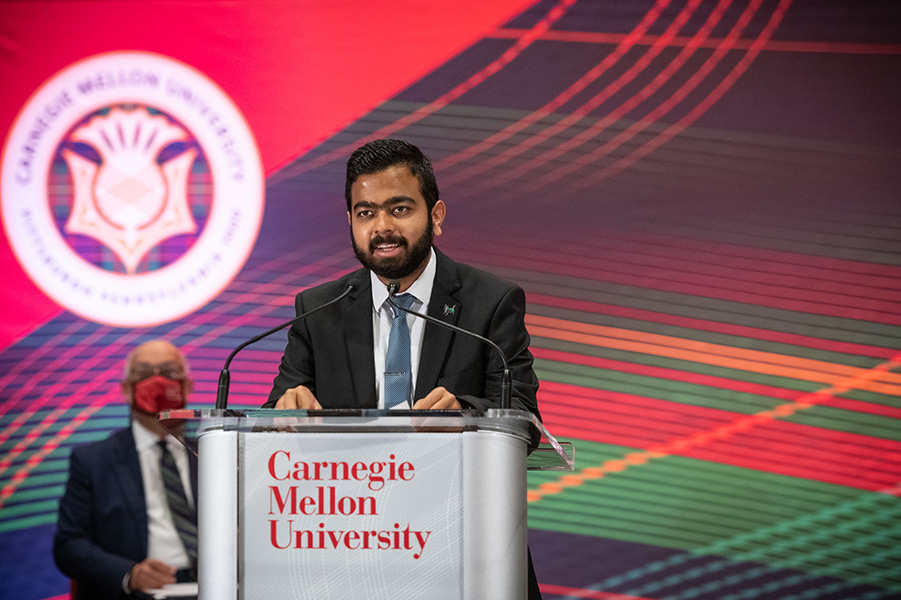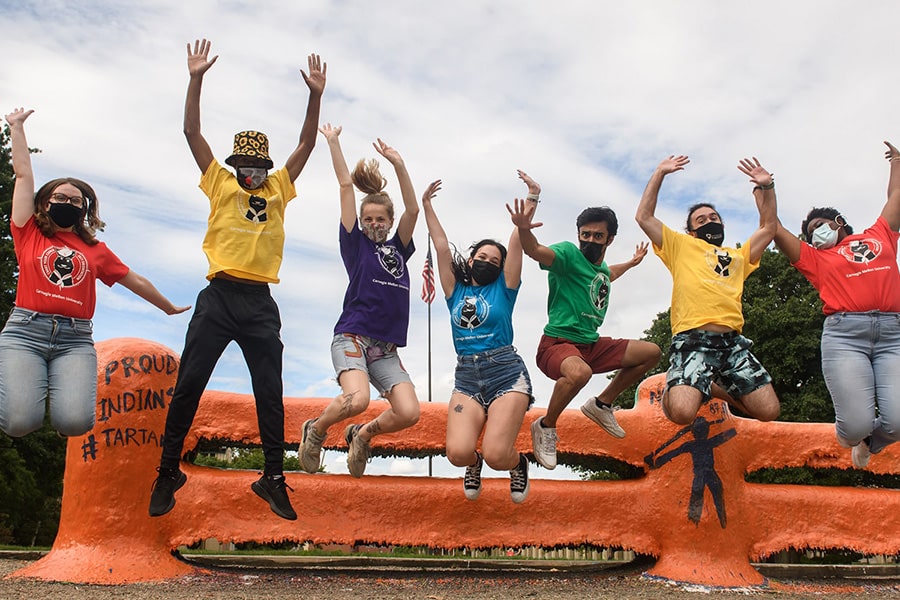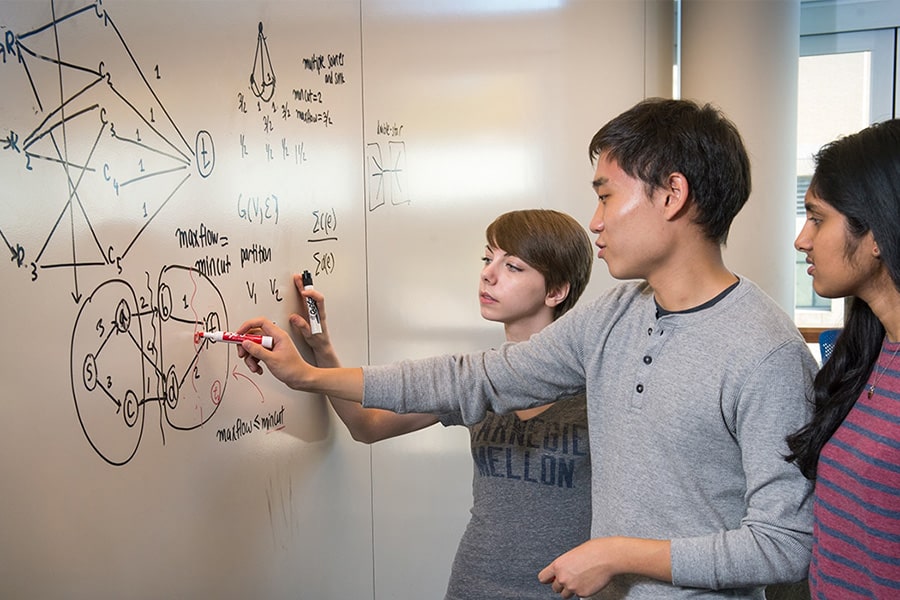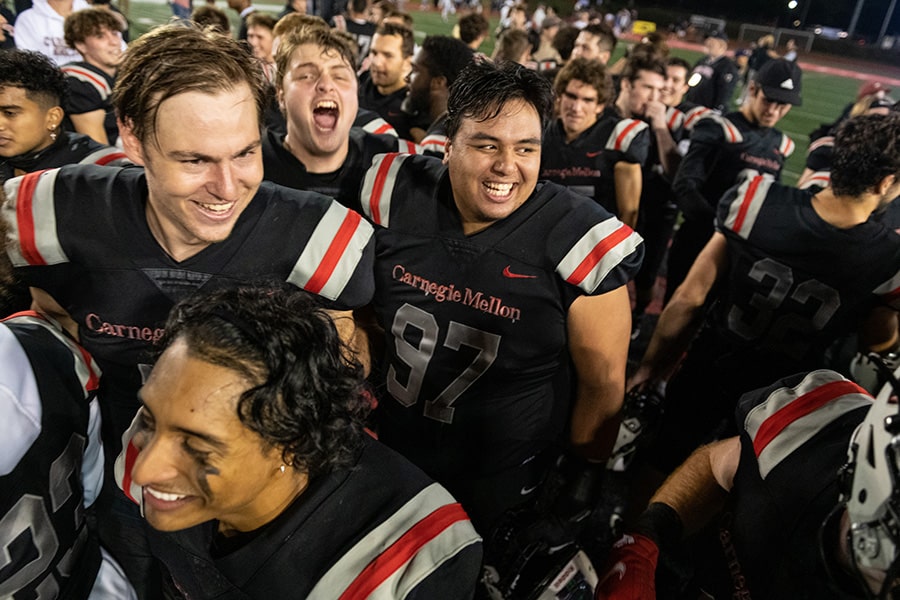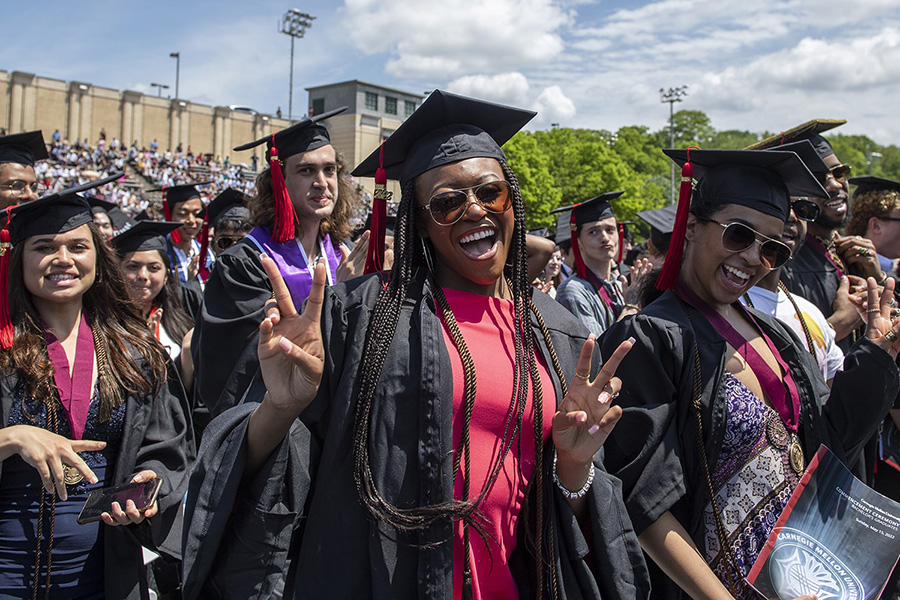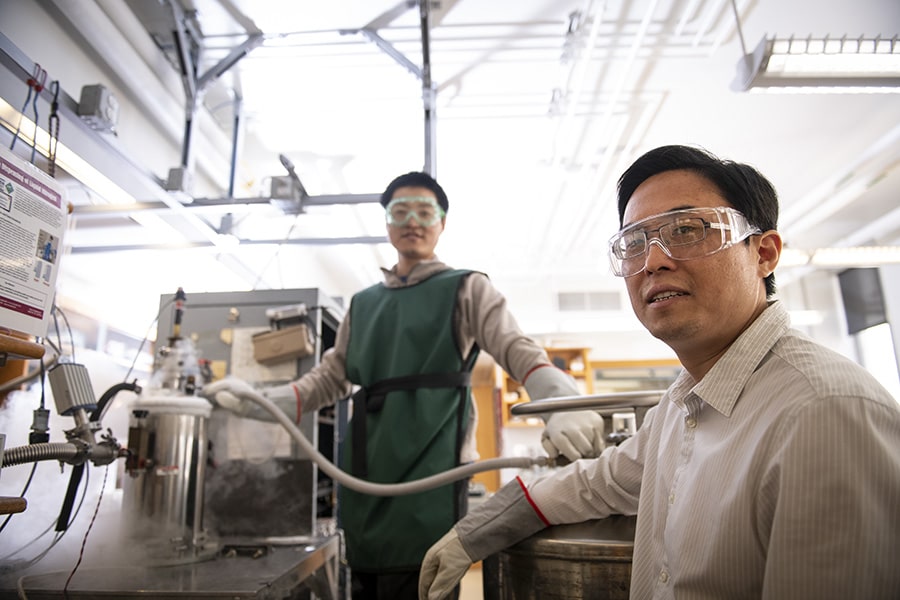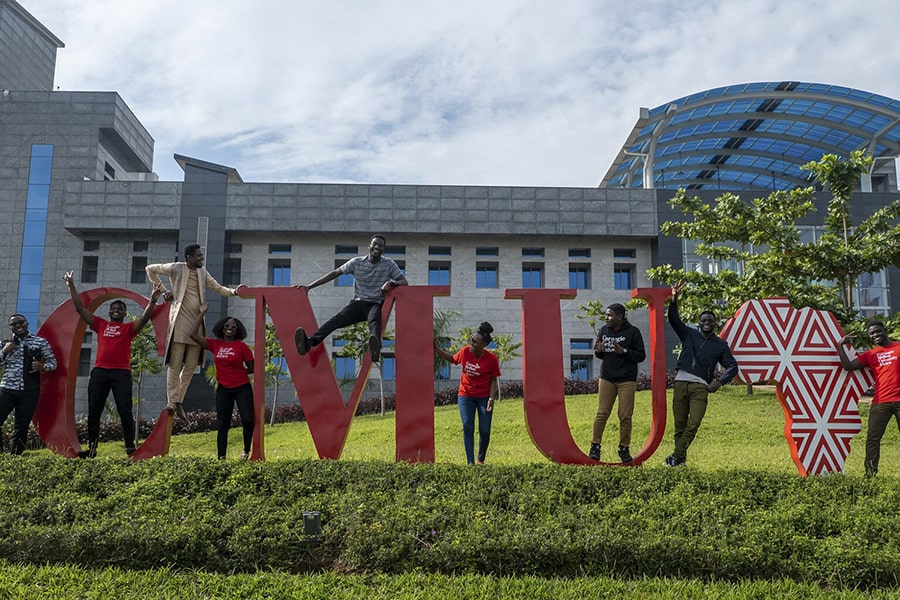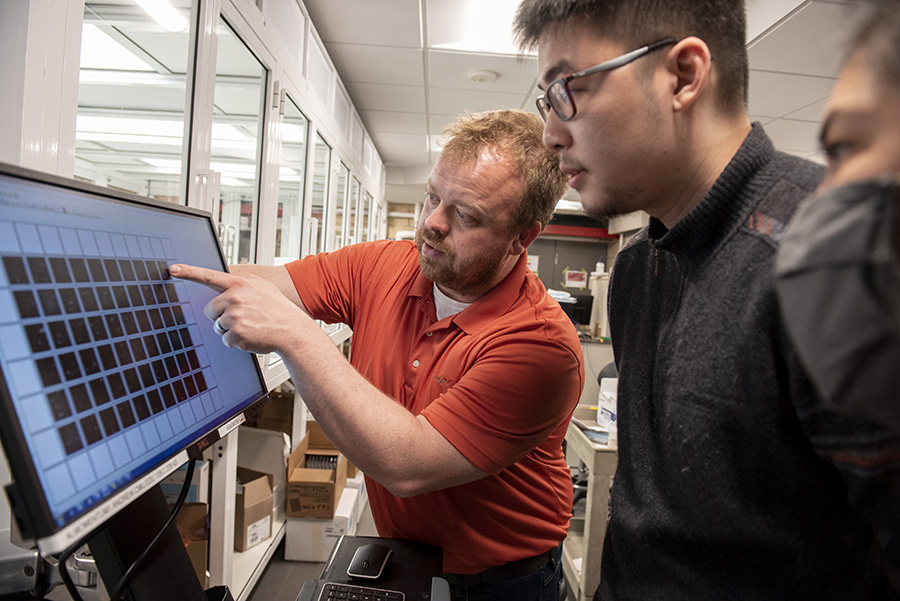Provost Division Year in Review
Academic Year 2021 - 2022
The Provost Division is advancing efforts across seven priority areas to strengthen the pillars of our institution, promote community health and well-being, support student success, and create a more holistically supportive and welcoming environment for the campus community. Here’s a look at some of the great work being done across the division to further these priorities across the CMU community.
Access and Affordability
Expanded holistic support to enhance the doctoral student experience.
Increased university support to 100% of the individual premium cost for coverage through the Student Health Insurance Program (SHIP), established a university-wide $2,250 monthly stipend and set guidelines for annual time away from program.
Helped students navigate the financial impacts of COVID-19.
Offered financial counseling and direct assistance for students experiencing extreme financial stress. Through federal grant programs, including HEERF and CARES, we helped students meet their needs for housing, food, technology and child care during a time of extreme uncertainty.
Focused on reducing student indebtedness, improving retention rates, and helping more students graduate in six years or less.
Our strategic and targeted efforts in these areas aimed to improve the student experience and ensure the students who come to Carnegie Mellon have the tools and resources they need to stay enrolled at CMU. As a result of these targeted investments, the U.S. News & World Report ranked CMU 22nd overall among National Universities in September 2022.
Developed more equitable general chemistry courseware with a grant from Bill & Melinda Gates Foundation.
In partnership with Arizona State University, investigated courseware development to publish on each institution’s respective online learning platforms. At CMU, this meant distributing innovative online courseware through OLI to improve the success of students with opportunity gaps.
Reimagined the Student Services Suite (S3) in response to COVID-era test-optional conditions.
In response to COVID-19, CMU did not require first-year applicants to submit ACT or SAT results. We modified the S3 system to implement efficiencies and expand decision-making support to manage 30,000+ undergraduate applications. We also built new logic to sort and identify highly accomplished and academically ambitious high school students, particularly in the absence of standardized test scores.
Launched a new program welcoming threatened scholars to Pittsburgh.
Through our Scholars at Risk program and in partnership with the New University in Exile Consortium and the Institute of International Education Scholar Rescue Fund and Artist Protection Fund, welcomed threatened scholars from Afghanistan, Algeria and Syria to Pittsburgh. Together with Chatham University, the University of Pittsburgh, and City of Asylum, we connected these scholars to Pittsburgh-based opportunities and facilitated enrollment and on-campus housing at no cost for three students from Afghanistan in Chatham University's immersive Academic English program.
Enhanced financial aid strategies to support incoming students.
Examined existing strategies to responsibly steward university financial resources to further CMU’s vision to support a diverse and inclusive undergraduate community, accessible for all. Revised financial aid packaging strategies to strengthen enrollment, support student retention and success, and optimize expendit
Diversity, Equity, Inclusion and Belonging
Created a Framework for Inclusive Excellence to integrate and underpin DEIB at every layer of the institution.
Developed and socialized this framework throughout the academic and administrative units. In partnership with the DEI leads, they are using this framework to map each unit’s DEI strategic plan to the broader university goals. The framework’s core concepts are Building a Diverse Community, Cultivating an Inclusive Culture, and Promoting Values and Accountability.
Continued to support outstanding scholars through the Strategic Faculty Opportunity Fund.
As a result of President Jahanian’s stated commitments to Confronting Racism and Promoting Equity and Inclusion, Provost Jim Garrett launched the Strategic Faculty Opportunity Fund in December 2020. This $15 million fund supports the recruitment, retention and development of outstanding scholars who will contribute to diversity and equity at CMU and enhance our reputation as a leading university. To date, 12 offers have been made with eight accepted and one pending.
Hosted and led community-wide events to celebrate equity and inclusion.
Offered several university-wide events that brought together the community, offered educational opportunities and lifted up our DEIB values. These included the MLK Keynote Address with Soledad O’Brien, a Juneteenth Keynote featuring Jamelle Bouie, the first annual Juneteenth reception with Sankofa, a Pride Month lecture with Hugh Ryan, and Heading Right to the Point: Discussing the Immortal Life of Henrietta Lacks with Dr. Wanda Heading-Grant.
Expanded access and inclusion efforts in the admission and recruitment process.
Explored strategies to eliminate the deepening inequality between the under-resourced and traditionally excluded applicants in our applicant pool versus those candidates from well-resourced and advantaged backgrounds.
Student Success and Experience
Grew resources for post-doctoral students to meet their unique needs.
Hosted an inaugural post-doctoral orientation and mentoring program to run throughout the year to offer support, programming and resources to meet the unique needs of this population.
Permanently converted the Graduate and Undergraduate Student Instructor Orientation (GUSIO) program to be online and asynchronous.
Offered greater program flexibility to graduate and undergraduate teaching assistants. Over 600 unique students filled almost 1,500 session seats, which included topics like “Creating a Welcoming and Supportive Climate from Day One,” “Conducting Productive and Engaging Discussions” and “Grading and Providing Feedback on Writing Assignments.”
Offered a record number of unique undergraduate research opportunities.
The Summer Undergraduate Research Apprenticeship (SURA) program aims to be a bridge to research experiences and an improved understanding of the process to lower barriers to engagement and broaden access and impact. The course awards tuition-free elective credit to CMU undergraduate students for existing faculty projects focused on undergraduate research or creative inquiry under the direction of a CMU faculty member.
Spearheaded a Student Success Steering Committee to support the student experience.
Led several student-centered efforts to guide student success through materials, support and outreach. This included piloting an advanced analytics platform to identify students with retention or graduation risk factors, creating a general studies major, and enhancing communication around student leaves, incomplete grades, and withdrawal processes.
Realizing CMU Education 2025
Continued the 14-week semester pilot to support student health and well-being.
At the recommendation of the Calendar Assessment Committee, continued the pilot designed to create symmetry between the fall and spring semesters, offer mid-semester respite for our teaching and learning community, and build in breaks that allow time for true rest and restoration.
Standardized an academic policy for on-time degree completion and certification.
Worked with key governance bodies to develop standard documentation to guide decision-making around on-time degree completion for undergraduate, graduate and integrated/accelerated degree programs. This supports our advisors, students and administrators as they define and verify thousands of degrees certified each year.
Launched a Core Competencies website to support educator resources in communication, collaboration, teamwork, and information and data literacy.
The Core Competency Initiative helps our teaching and learning community provide opportunities for students to enhance and track their development in several core competencies. The initiative’s Data Literacy group will soon release their final report, and the Intercultural & Global Learning + DEI group has defined its outcomes and conducted a landscape scan. A process for more accurately “tagging” courses that support particular competency development is being piloted.
Explored expanding and innovating in online master's and professional education.
Worked with academic and administrative leaders to consider establishing on-brand, online graduate and professional offerings. This is in support of working professionals who are seeking new positions that require upskilling and re-skilling, and they are expecting to be able to engage in this learning via online modalities and often in smaller chunks. CMU is poised to offer innovative educational programs in areas with great market demand and in which we have rich industry partnerships.
Faculty Experience and Success
Supported a record number of instructors through teaching consultations at the Eberly Center for Teaching Excellence & Educational Innovation.
Delivered the highest number of consultations delivered in a year, supporting over 420 CMU educators. These one-on-one sessions shared strategies on course design or redesign, aligned teaching strategies with learning goals, implementation of evidence-based teaching strategies, creative ideas for assignments and projects, and assessments for education-related grant proposals or research.
Developed instructor-focused workshops and resources to promote DEIB in teaching.
To promote inclusive teaching practices, instructors were invited to participate in the Provost’s Inclusive Teaching Fellows program, customized DEI-focused departmental workshops and the Spotlight on Inclusive Teaching event. New website resources were also created and published.
Offered faculty professional development opportunities, including the return of the Teaching and Learning Summit.
In response to the evolving needs of our educators and higher education trends, we conceived, designed and implemented several new faculty programs, including the Special Interest Group on Specs Grading and Ungrading, Innovative Models of Undergraduate Research, and the Spotlight on Inclusive Teaching. Over 200 attendees participated from our campuses in Pittsburgh, CMU-Africa and CMU-Qatar. We provided scholarships to 14 faculty members to take part in the Faculty Success Program offered by the National Center for Faculty Development, a commitment that will continue for new faculty cohorts. Through the MindShare program, 11 faculty members gave talks to CMU alumni group audiences.
Conducted teaching-track and tenure-track salary equity studies.
We tasked Reed Smith LLP with conducting these internal studies to examine gender and race/ethnicity-based equity in the salaries of tenure track and teaching track faculty in CMU’s U.S.-based faculty. The 2021 Salary Equity Study revealed no statistically significant disparity between the salaries of men, women and underrepresented minorities.
Global Education Strategy
Welcomed a record number of international students in fall 2021.
The pandemic negatively impacted the ability of international students to arrive in fall 2020, which led to a surge in newly arriving students in 2021. We navigated the unique challenges COVID-19 posed to help bring international students back to our Pittsburgh campus. International students represented 21% of the 2025+ incoming undergraduate class and 63% of the graduate class.
Recognized the seventh, eighth and ninth cohorts from CMU-Africa.
The 2022 graduation ceremony presented the opportunity to salute and celebrate the seventh, eighth, and ninth cohorts of CMU-Africa students who successfully navigated unprecedented terrain caused by the COVID-19 disruption in their educational pursuit of a master’s degree. Allen Robinson was named the new director of CMU-Africa in 2021.
Celebrated the 15th graduating class from CMU-Qatar.
Carnegie Mellon University in Qatar, a Qatar Foundation partner university, celebrated 89 graduates in the Class of 2022 representing each of the four programs of study at CMU-Q: biological sciences, business administration, computer science and information systems. There are 23 nations represented in the Class of 2022, and 44% are Qatari citizens. Including this class, there are over 1,000 total CMU-Q alumni.
Sustainability, Efficiency and Effectiveness
Co-organized INTERSECT@CMU 2022: Innovating A Sustainable Future for All.
This university-hosted conference focused on the Global Goals and the actions we must take to ensure that the next generation will live on a more sustainable planet. Speakers and panelists discussed urgent issues facing our planet as they relate to cities and infrastructure; peaceful, just and inclusive societies; climate action; and resilient and inclusive economies.
Championed the University Leadership Dashboard project to support decision-making across the university.
In partnership with Computing Services and the Finance Division, launched this multi-year initiative to develop tools and standards for sharing managerial and operational data across CMU. The project will grow our data analytics community and promote collaboration across functional areas. It aims to create a "one-stop-shop" for leaders to discover, share and use valuable data.
Engaged with the Global Goals through science, data and technology.
Supported our students as they organized events in support of sustainability, including Shapetopia, a virtual city conceived by six students. As the new mayor(s) of this city within a video game, players partake in policy decisions to discover how sustainable choices weave together to affect the quality of life in a society. Scopeathon brought together some of Pittsburgh's nonprofit leaders, data scientists and university students for the benefit of local communities.
Conducted a carrying capacity analysis to understand resource constraints related to enrollment growth.
Analyzed course enrollment data to study course section fill rate, classroom utilization and scheduling time blocks. This project also identified resource gaps and created enrollment capacity and classroom utilization dashboards. The findings will inform future decision-making so that we can maximize space to meet the resource needs of our teaching and learning community.
Analyzed residential master data to identify trends and inform decision-making.
Manually collected applications and admissions data from all colleges and programs. Developed a market opportunity analysis tool. Built a dashboard to create profiles for all master's programs, as well as to show graduate enrollment trends by program.
Developed an academic assessment plan to enhance participation and reduce survey fatigue.
Interviewed key academic leaders and stakeholders to better understand their academic assessment needs. Based on this, developed a plan with a four to five-year calendar of surveys, including an accompanying responsibility matrix for those involved in the processes.
